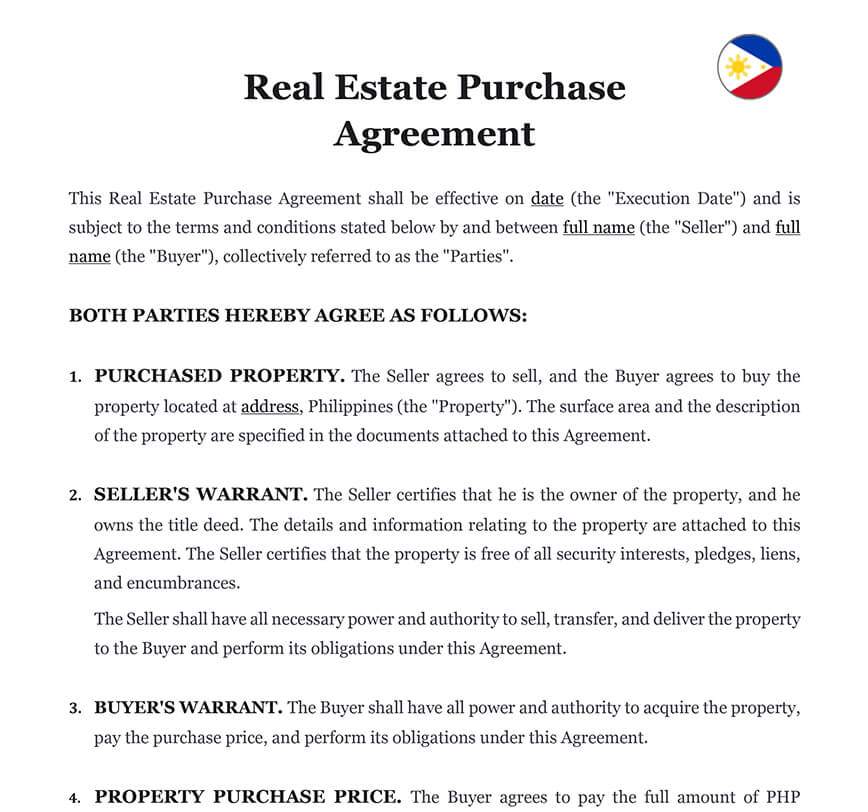
A Real Estate Purchase Agreement is used by buyers and sellers to confirm their intent to enter into a transaction in the Philippines and to determine the obligations of both parties.

Word Document (.docx)

Ready to use legal template
Drafted by experienced lawyers
Compliant with Filipino law
Ready to use legal template
Drafted by lawyers
Compliant with Filipino law
Home › Buy a property › Real estate purchase agreement
A Real Estate Purchase agreement is a legal contract between a seller and a buyer for the sale of a property that controls each party’s mutual promises. It is a formal document that proves the sale and acquisition of a property and that contains a written pledge to sell property for a fee. It documents the terms and circumstances of such transfer and payment, as well as the penalty for failure to transfer or pay the property. They are more or less distinct depending on the builder’s tasks. For more legal documents related to buy a property, you can consult the Construction Contract or Intent to Purchase Letter.
A Real Estate Purchase contract details the conditions on which a buyer and seller have agreed to embark into a real estate transaction. The signature and fulfillment of a purchase contract essentially puts the buyer and seller “under contract.” As such, it is a legally binding contract that describes the important aspects of the house selling transaction and is also known as a real estate sales contract, home purchase agreement, or real estate purchase agreement. When a buyer makes an offer to acquire a new property, he or she proposes conditions of sale and crucial financial data such as the offer price.
The seller will then have the option to accept, reject, or negotiate the offer’s conditions. Following any continued talks in the form of counteroffers, both parties will sign the purchase agreement whenever they are happy with the parameters of the agreement. At that point, the property for sale and all parties to the transaction will be considered “under contract.” As a result, this contract indicates all parties’ intent to join into a house selling transaction and describes what criteria must be satisfied for the sale to close and the property to be transferred to the new buyer.
A Bill of Sale is an extremely important document in the purchase of any property. It is a written agreement that transfers property rights from one person to another through the use of a deed. As such, this document grants the buyer the right to use the property in perpetuity. In other words, the deed grants the buyer the legal right to use the property. The most important thing to remember is that you cannot claim ownership of the property without a deed.
The settlement is the final step in the home buying process. This is the point at which ownership of the property passes from the seller to the buyer. The funds will be distributed in the form of a check to the sellers, a check for the commissions earned by the real estate agents involved in the sale, and a cashier’s check in the amount of the closing costs if the buyer has not already wired the money to the title company. There is a lot of paperwork involved when the settlement process starts.
The documents will be ready at the escrow company. They only need to be signed. During this process, buyers will sign their names anywhere from 10 to 30 times. On the day of the settlement, many significant events occur. The buyer must provide a check for the total amount owed for the home’s purchase price. The seller will sign over the deed to the buyer. When this is signed, ownership of the home is transferred from the seller to the buyer, and the buyer receives the keys.
The title company will register the new deed with the government, identifying the buyer as the new owner. Finally, once the closing costs have been paid and the mortgage loan balance has been paid off, the seller will receive any remaining funds.
Former natural-born Filipinos can own property in the Philippines, subject to limitations prescribed by Philippine Republic Act 8179 (residential property up to 1000 square meters of urban land or one hectare of rural land) and Batas Pambansa 185 (business property 5000 square meters of urban land or three hectares of rural land).
Philippine real estate law does not allow outright ownership of real property by foreign nationals. Filipinos and former Filipino citizens and Philippine majority owned corporations are permitted to own land, buildings, condominiums and townhouses.
Foreign nationals may buy condominiums units in Philippine condos (shares in condominium corporations) as long as not more than 40% of the units in a project are acquired by foreigners (Republic Act 4726, otherwise known as the Condominium Act).
Here are the exceptions allowing foreigners to acquire land in the Philippines:
| ➤ Property was acquired prior to the 1935 Constitution |
| ➤ Property was acquired through hereditary succession, with the foreigner being a legal or natural heir |
| ➤ Purchase of a unit or units in a condominium project, subject to 40% foreign ownership limit in the condominium corporation |
| ➤ Purchase of land by a domestic corporation, subject to 40% foreign ownership rule |
| ➤ Purchase by a foreigner married to a Filipino |
| ➤ Purchase by a foreigner who was originally natural-born Filipino, subject to limitations set by the law. |